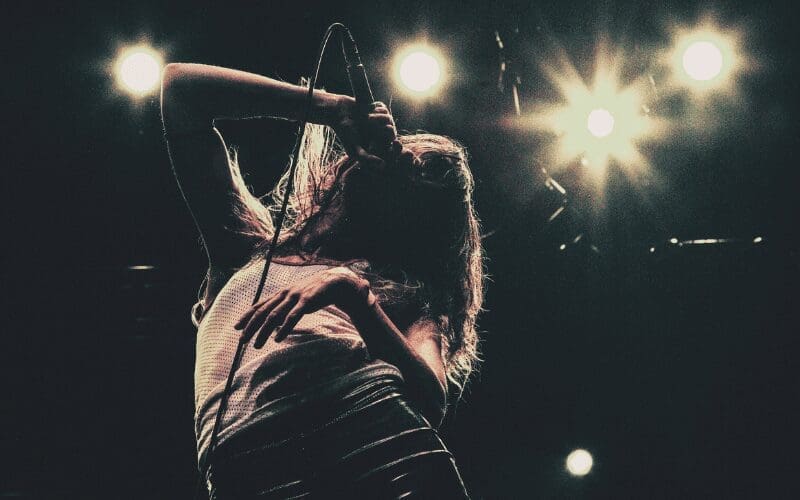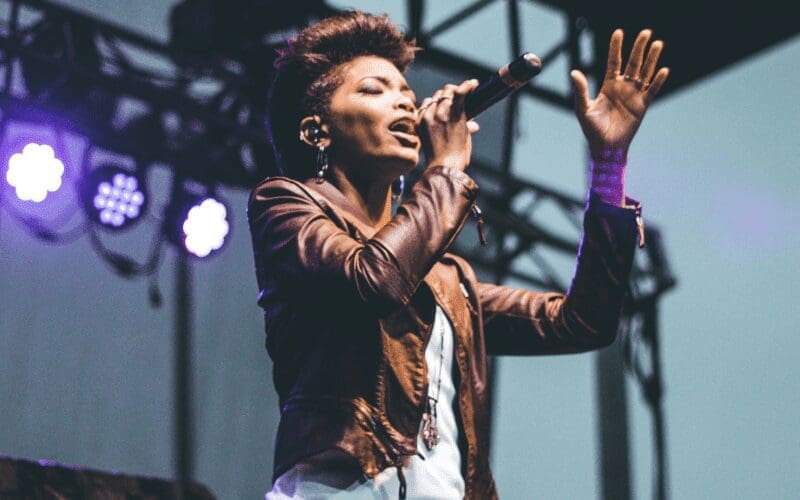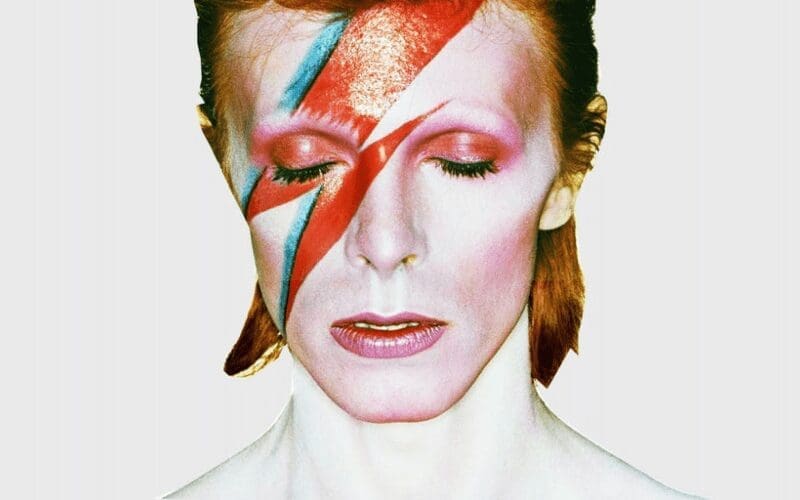You can be the most talented artist in the world, have insane vocals and write killer lyrics, but if you don’t have the stage-presence to show these skills off, your chances of success are significantly lower. You have to give yourself to your audience, let them in to your music.
“When you walk onto a stage, it’s about being vulnerable” David Byrne, Talking Heads
Stage presence is the difference between playing your music in front of thousands of people, and fading away into the background. The good news is if you don’t naturally have great stage presence, you can learn the tricks and tools to get there!
In this article, we’re going to go through what stage presence is, how you can build on it and some example of great stage presence! Keep reading to learn more!

What Is Stage Presence?
Stage presence is that certain charisma and charm that an artist, singer, performer etc possesses that draws in an audience and commands their full attention. Stage presence is something you find hard to define as an audience member, but you certainly know when you see it! It’s not about being tall, or beautiful or have rippling muscles, it’s something that makes your performance stand out, it makes you memorable as an artist.
Why Is Stage Presence Important?
As stated before, having a good presence on stage is so hugely important as it can make or break your career in terms of success. Combined with skill, experience and hard work, stage presence can create a combination that turns “good” performers into stars and legends. It is important because it makes your performance enjoyable to watch. Having good stage presence allows for small mistakes. Because you’re so engaging to watch, audience members won’t pick up on the minor mistakes made, choreography fails/ technical issues etc. Having good stage presence can extend your fanbase and help with your overall image.

Dua Lipa Stage Presence
Singer-dancer Dua Lipa has been under the media lens for her so-called “lack of stage presence.” People have been performing live for centuries, but we’re now in the age of camera phones and hi-speed videos, putting more pressure on performers to be “perfect.” In this age of nitpicking-by-gadget, Dua Lipa’s seeming detachment and tiredness become oversized. The bad news is that critics (many of whom would never set foot on a stage) create media Mao-isms, parroting exaggerations about big-name pop stars. The good news is that performers, pop star or other, can respond by ignoring the naysayers, upping their game, and following their true quest.

How To Have Good Stage Presence
We’re going to give you some tips on how to have stage presence for your gigs going forward!
Find Your Drive
Find your drive in how you phrase things, how you punch the music, how you arrange your beats and rhythms. Feel like you’re driving your music through your audience into the back wall, over the curvature of the earth. It’s no good to play at an audience. You’ve got to try and move them. Don’t focus on who is sitting in the front row—they’re already connecting. If you start to worry about individuals, you flounder. Instead, play to the back of the room. Get the people in the back engaged and their energy will move forward. The music will raise you up and everyone else in the room with it.
Always Say “Yes” To A Challenge Onstage.
Don’t be afraid to have demands made of you in public. In fact, invite it. Expect it. Make it part of the act, even if something is going haywire. Learn to turn on a dime.
Be aware
Be aware that when you take your recording out to the stage, you discover a new facet of it. You will change. The music will change.
Pace Your Set List
Pretend it’s like getting a massage: The masseuse doesn’t take their hands off and break the flow till it’s truly over. Same applies to your set. Identify what works, whether it’s going from one song to another with no break, or few breaks, or the traditional talk to set up a song. Tip: David Byrne said that, whenever possible, avoid the worn out phrase, “This next song is about…” Instead, play quietly underneath your stage patter, or skip the patter altogether and let the music breathe. When you do speak, enunciate as you’re thanking people and introducing band members or song titles (especially in venues with poor sound). Speak your words at half speed. It makes you sound less nervous and people won’t think you’re mumbling (which sounds amatuer and frustrates audiences).
Express Yourself
Acknowledge your own freedom of expression in sound and movement. It’s like ballet. Feel the tension of the audience. Harness your own odd stage mannerisms. Be aware that your style feeds the style of other performers on the stage. Don’t let ego over-drive or upstage others, but also be aware of positive energy feeding the other players.
Be Conscious Of Volume
Let the rise and fall and rise of volume create a drama. Staying at one volume causes a flat dynamic that can fatigue people.

How To Be Confident On Stage Whilst Singing
If you’re fronting a band, or going out as a solo performer, the pressures are different than if you’re one of the backing prodigies in the band. You are now a “front man” on behalf of thousands of people whose dreams you’re making come true. It’s the person in front who not only has to know their parts, but must engage the audience. To have the showmanship that makes people forget everything else except what’s in the room right now, connecting presence to “being present.” There are lots of ways to have stage presence as a singer. Here are some tips on how to perform singing on stage with confidence!
Be Prepared
Confidence favours the prepared. Vocal health and discipline are essential. 30 minute warm-ups are ideal, but also learn short form warm-ups to loosen up your voice before you go on mic. Warm-ups loosen up your range and protect you from damaging your vocal chords. Before a show, avoid eating heavy food and imbibing drinks that dry out your throat (like alcohol). Always have water onstage, best at room temperature (too cold or too hot shocks your throat).
Know Your Stuff
The vibration of your voice resonates with people. Learn about microphones, gear, acoustics, and how sound travels. This enhances your performance and improve your communication with a sound person. When you get to a venue for sound check, study the room. Look and listen for how you project naturally and for “sweet spots.”.
Think About Your Wardrobe
How you comport yourself and what you wear whispers messages to people. Your wardrobe is your job uniform and your connection with how strangers perceive you. Every gig has wardrobe specs, whether you’re a punk rocker or a symphony player. Learn these specs and work them. Most importantly you want to feel comfortable in what you’re wearing. If wearing tight clothes makes you tense, you’re not going to give a shining performance!
David Bowie is a perfect example of using wardrobe to wow an audience, transforming from an unremarkable pre-1969 hippie-folk persona into unforgettable characters such as Ziggy Stardust and The Thin White Duke. Bowie also thrived on the safety zone an artist can create for themselves with stage presence.
Let The Audience In
Your brave self—that exaggerated extension of your personality—is what people connect with. Are you witty? Are you spiritual? Channel that side into something people want.
Be Yourself
Ultimately, you have to be yourself. Be comfortable in your own skin and be able to self analyse and see what aspects of your personality are interesting for an audience. Never totally change yourself, it’s not sustainable for a (hopefully) very long career in music. Feel great in yourself and your audience will as well!

Final Thoughts
In closing, love the audience and let them feed you, but don’t depend on an audience to create a positive vibration. It has to start with the performer. It’s a symbiotic synchronization. The way everyone on stage plays together creates a harmonic. When that happens, it moves the audience up a notch, which moves the performers up a notch, and so it grows. It doesn’t have to be a tangible thing or a formula. It’s an energy being transmitted by you and through you. When you’re on a stage, you are making dreams come true, for your audience and for yourself.










